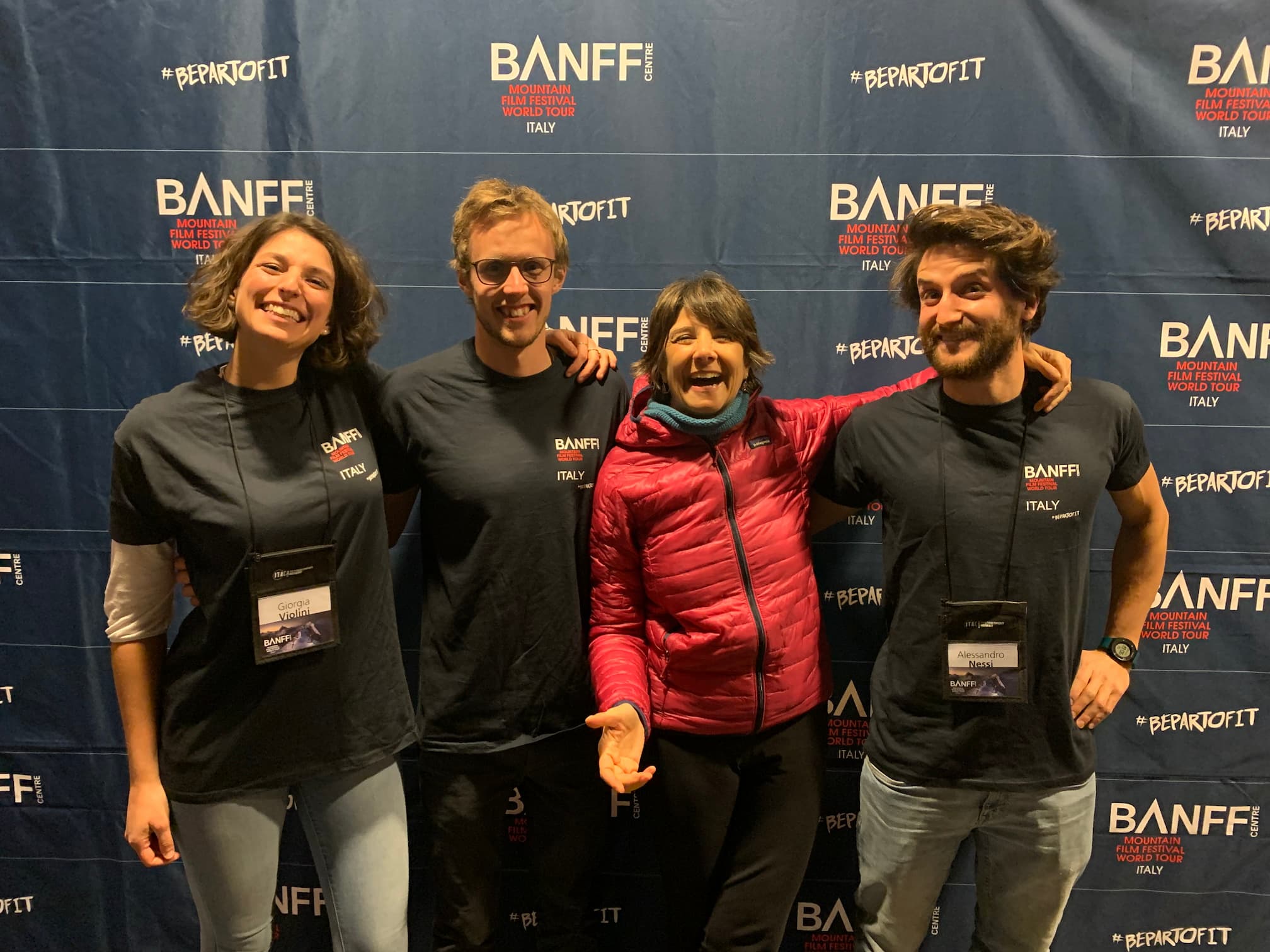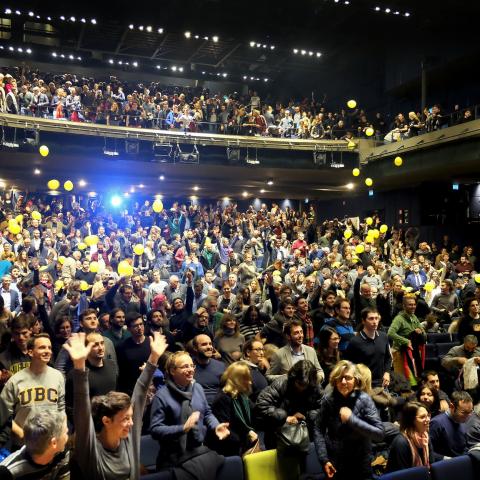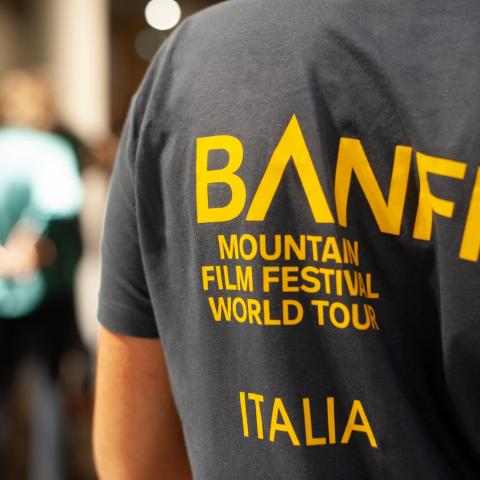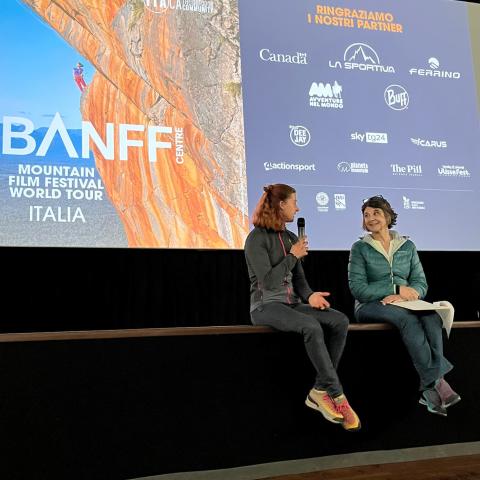
Please tell us about yourself Alessandra?
I graduated from the University of Genoa (my home town in Italy) – in economics and business studies – but lacked passion with my studies and wanted to explore the wider world instead. Living between London and New York, it was in NYC that I became a museum guide at the Metropolitan Museum of Art, touring Italian-speaking groups of visitors. Ten years later, I returned to Italy, to Milan, and started working with art book publishing houses, then moved into the genre of mountaineering literature (as a photo editor, editor, writer, and press office).
I knew about Banff, and I was eager to find a way to start working with the festival. It was by chance that I came across the World Tour. On a cold Monday morning in January 2012 – sipping a coffee as I was starting my day – I asked my husband Stefano: “Shall I do it?”
Ten months on, we found ourselves sitting on an intercontinental flight to Calgary with our 12-year-old son Paolo, excited to attend our first festival in Banff. It was our first visit to Canada, and as a mountain and outdoor enthusiast, it was love at first sight!
In 2013, I established a nonprofit association organizing events in Milan with friends – curating slides and film screenings with guest mountaineers and climbers, book presentations with writers and journalists, and small speaker panels. I also co-curated a series of exhibitions for the Cervino Guide Society in Cervinia, culminating in 2015 with a final exhibit showcasing the history of this iconic mountain, from the first attempts to conquer the summit to the most recent exploits, as part of the celebrations of the 150th anniversary of the first ascent of the Matterhorn (1865-2015).
The first edition of the BANFF World Tour in Italy started in March 2013, with six shows kicking off in Milan – where I live with my family – and in my place of birth, Genoa. It was a great success. The project was new in Italy – in terms of format, film program, and the kind of community it addressed – young, mountain, and outdoor lovers open to the new trends in cinematography and outdoor sports. Along the way, BANFF-goers also realized that the “BANFF” – its nickname in Italy – was a great annual event to meet old friends, make new ones, and get inspired to start projects with them.
Over the years, the small project we started has grown into a company – ITACA The Outdoor Community – and includes a team of professionals who also run the OCEAN Film Festival World Tour and Reel Rock tour in Italy (since 2017) and the streaming platform ITACA On Demand showcasing adventure films only.
Describe a typical day in your life as a World Tour host?
There is a big difference between our daily routine when we’re on tour or in the office. Daily routine in the office does not necessarily mean quiet hours but we try to remain focused on debriefing once the tour is over, organization, communication, promotion, and implementation and development of any new strategies to make the next tour always a better experience to the audience.
Routine on tour:
- Road warrior travels to the venue
- meet the Trail Team, brief, and assign precise roles. Hand out Banff t-shirts to wear as a uniform and send them out for a sandwich so they’re ready for the audience to arrive
- brief to the official photographer
- check the program schedule with the projector operator (sound, film, sub, stops/plays, lights on/off, mic, etc.
- set up of the foyer and the room
- welcome audience coming in
- hand out complimentary tickets to registered guests
- welcome sponsors and their ambassador
- start the show on time! It's always exciting when the legendary Banff intro video starts playing on the screen, you can physically feel the excitement and good vibes in the room
- running the raffle at intermission
- promote next year's date
At that point, we’re lucky if we find a place where to grab some food. The next morning, a stop at the best patisserie in town for a cappuccino and croissant. Back to the hotel to get some office work done, and then back on the road for the next stop. Travelling time is always a great occasion to plan stops to visit monuments, museums, and other interesting spots along the way, and gives us the opportunity to see our wonderful country and find inspiration.
Tell us about any funny stories, memorable moments, and mishaps from the road?
In 2018, we hosted a screening for the first time in an important theatre in Milan – the Teatro Nazionale. We counted 1300 people and had to schedule a second event the day after (another 400 people) – wow, that's when we knew we were heading in the right direction!
At a screening in Milan (2015), the Italian subtitles stopped working. We had to stop the show and get the cinema technicians to fix it – asking a room of 700 people to bear with us! The techs eventually managed to get the subtitles working again, but then there was a lot of anxiety around the second part of the screening – will it continue to work? As the opening film started (featuring Cedar Wright), there were no subtitles on screen. It was hard to believe his strong US accent was understandable, but the Milan audience was excited and proud enough to let us think they understood (it was probably the right city to experience such a disaster!).
In Bergamo (2016), we had a problem during the screening. At one point, the face of one of the most renowned Himalayan alpinists started melting into bright and colorful pixels. Dashing to the projection room, I discovered the technician had eaten a pizza just before setting up the projection and had left an oily thumbprint on the face of the DVD – that was the last time we used DVDs before switching to digital format.
What would you say are the differences/challenges hosting in your country?
The big challenge in hosting a tour in Italy and organizing events is bureaucracy - such a degree of bureaucracy is quite unique to Italy. It is time-consuming and a waste of energy that could be more beneficial to channel into communication and business development.
Summer and other vacation periods during the year endanger a smooth flow in the communication and promotion of the event.
Since the pandemic, cinemas have increased rental costs and restructured venues (in terms of smaller and smaller rooms), and, presently, there is little margin to increase ticket prices.
Beyond these constraints, we keep focusing on rethinking our strategy in terms of organization, logistics, new market trends, and new audience interests and enhancing ITACA digital transformation and a more sustainable way to travel the country to present the shows.
Author: Alessandra Raggio (World Tour Host, Italy)
If you’re interested in becoming an international World Tour Host (for countries outside of Canada/USA), please email: worldtourinfo@banffcentre.ca





